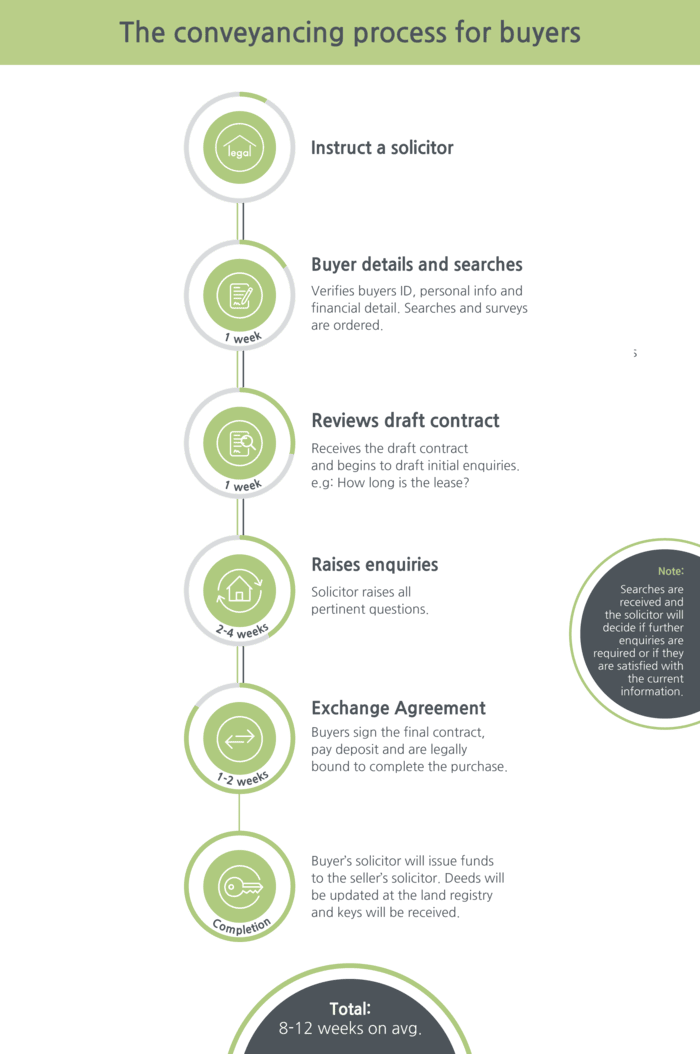Buying a house is a significant step, and we're here to guide you through every stage of the journey.
From the moment your offer is accepted to receiving your keys, our panel of expert conveyancing solicitors will ensure a smooth process.
We handle all the legal details, ensuring your purchase progresses efficiently while keeping you informed at every stage.
What is the conveyancing process when buying a house?
We illustrate the conveyancing buying process on the following infographic.

If you're wondering what solicitors do when you're buying a house, here we explain the key keys stages of the purchase conveyancing process once an offer has been accepted:
- ID documents and instruction forms are completed by the client
- The purchaser's conveyancing solicitor receives contracts from the seller's solicitor for review
- The purchaser's conveyancing solicitor raises enquiries of the seller's solicitor
- Searches are ordered from local authorities, the Environment Agency etc
- Terms are agreed and a date is set for completion
- Exchange contracts
- Completion - the day you move in!
Post-completion formalities - this is the finalising of the stamp duty payment to HMRC, registering of the title at the Land Registry and dealing with the final documents to the client.

What a conveyancing solicitor does for you when buying a house
When you instruct a conveyancing solicitor or licensed conveyancer through Homeward Legal, we endeavour to meet any requirements you have, including providing you with a property purchase solicitor who knows the area in which you are buying. Once instructed, your conveyancing solicitor ensures the seller has the legal right to sell the property, that the land itself is free from issues and that all financing is in order.
They will ask the seller's solicitor a number of questions (known as enquiries) about the property's use and history and carry out important property searches.
Your solicitor for the house purchase must also check the mortgage arrangements, as well as looking after the lender's interest where a mortgage is being taken out.
There is more work and risk involved when representing a buyer because of the legal principle known as caveat emptor or ‘buyer beware'. This means it is the responsibility of the buyer's solicitors to raise all pertinent questions about the property. Buyers must be aware there is no obligation on the seller to disclose anything unless asked directly.
Using a solicitor for the house purchase will make the process easier. All you need to do is complete any forms and sign any documents as soon as possible to ensure there are no hold-ups to the conveyancing process.
When to instruct a solicitor when buying a house?
When to instruct a solicitor when buying a house?
Ideally you'll want to appoint a solicitor for buying a house as soon as you have put in an offer on a property and before you have finalised the mortgage for it. But you don't need a conveyancer before you make an offer.
How much does a solicitor cost for buying a house?
How much does a solicitor cost for buying a house?
The cost for conveyancing solicitors when buying a house can vary widely depending on the value of the property, as well as if the property is leasehold or freehold.
At Homeward Legal, the solicitor fees you are quoted for conveyancing will be exactly what you pay, with no hidden costs.
How long does conveyancing take?
The conveyancing process typically takes between 8 to 12 weeks on average, although this can vary based on individual circumstances.
Factors influencing the duration include the chain of transactions, local searches, mortgage approvals, and any legal complexities that may arise during the process. It's essential to communicate effectively with your conveyancer and other parties involved to expedite the process as much as possible.
You can also check our guide on how long the conveyancing process takes.
When do I pay my solicitor's fees when buying a house?
When do I pay my solicitor's fees when buying a house?
When you receive a quote from a conveyancing solicitor, it will contain a number of additional items called disbursements. These relate to the fees and taxes the solicitor has to pay other organisations as part of the house-buying process, such as local search fees, drainage and water search fees and flood risk reports.
You may be asked for some payment up front to cover these various searches. With Homeward Legal, our friendly, professional team will explain the disbursements and fees in detail and tell you which ones you will need to pay up front. You will pay the remaining fees, along with your solicitor's fees upon completion.
Why choose Homeward Legal for your house purchase?
We've established an excellent reputation you can trust and helped over 30,000 customers in the past 13 years.
Editable block title (hide option available)

Fixed Legal Fee policy
No hidden costs - the legal fee you get quoted is definitive.

No-Completion, No-Fee policy
You won't pay any legal fees if your move falls through for any reason.

Search & survey protection
You won't pay for your next search and survey if your transaction falls through.

Complete support
Dedicated customer service from start to finish. We are open 6 days a week.

Local knowledge
Solicitors with offices across England and Wales.

Simple & straightforward
No confusion with legal jargon - just plain and simple English.
Our conveyancing solicitors are regulated under the Solicitors Regulation Authority (SRA) and Council for Licensed Conveyancers (CLC).
Get in touch for your buying conveyancing quote
If you're looking to buy a property and need a solicitor, get in touch with us today.
Call us on and our friendly team will be happy to help.
Alternatively, you can fill the form below to get an instant quote.
Frequently asked questions...
When considering to buy a property, it's wise to:
- Arrange a property survey to uncover potential structural issues.
- Ask the seller about past renovations or known problems.
- Carefully inspect the property for signs like cracks or dampness during viewings.
- Review the local authority search for property-related notices.
- Consult with professionals like structural engineers or building surveyors for a detailed assessment if you have concerns.
Many contaminants can impact a residential property. These need not be restricted to chemical or mineral pollutants either, since investigations into contamination also include proposed erection of mobile masts, or the proximity of electricity pylons.
Where the property has been built on former industrial or agricultural land, consideration will be given to any known pollution that exists in the topsoil or in the vicinity. All aspects of the environmental impact to the property will be considered as part of the environmental searches and reported in the conveyancer's report on title for the property.
Property surveys assess a property's condition and identify any structural issues or defects. While not legally required, they're highly recommended to understand the property's condition before purchase. There are various types of surveys, from basic condition reports to comprehensive building surveys. Surveys help buyers make informed decisions, negotiate prices, and plan for future maintenance or repairs.
When buying a property, legal steps involve engaging a solicitor or conveyancer, conducting property searches and surveys, finalizing the mortgage offer, exchanging contracts, and completing the purchase. You'll sign documents like the Contract for Sale, Transfer Deed, and Mortgage Deed, overseen by your solicitor to ensure legal compliance. Learn more in our conveyancing process guide.
Searches are checks carried out by solicitors or conveyancers during the home-buying process to identify any potential issues with the property or land. Common searches include local authority checks, environmental risks, drainage and water access, and planning permissions. These ensure you're fully informed before proceeding.
You can also check our conveyancing searches guide.
No. With Homeward Legal's panel of conveyancing solicitors, when you get a quote for conveyancing services from us, the legal price we quote you is the price you'll pay.
You should be aware, however, that some property solicitors do not give accurate quotes, only estimates, often putting standard conveyancing fees in the small print, possibly to make the headline offer seem far more attractive. The final bill you receive may then be much more than you budgeted for as a result. With Homeward Legal, we offer Fixed Legal Fee conveyancing quote with no hidden charges and with our No-Completion No Fee.
If in the unfortunate event that your property transaction falls-through you will not be liable for any of the conveyancer's fixed legal fees for the work completed.




